Critique Arena Journal
-
Have decided to start a thread for documenting my process and learnings from working on critque arena pieces. Hope it will keep me motivated to keep creating, critiquing my own work, and learning from past mistakes, and that maybe others will learn something from my process and mistakes as well.
As always, feedback and critique is welcome! Destroy me!

So my first ever entry was for the prompt in May, "Storm". Thanks to the couple of folks who took the time to critique my piece, I now know better what to look out for.
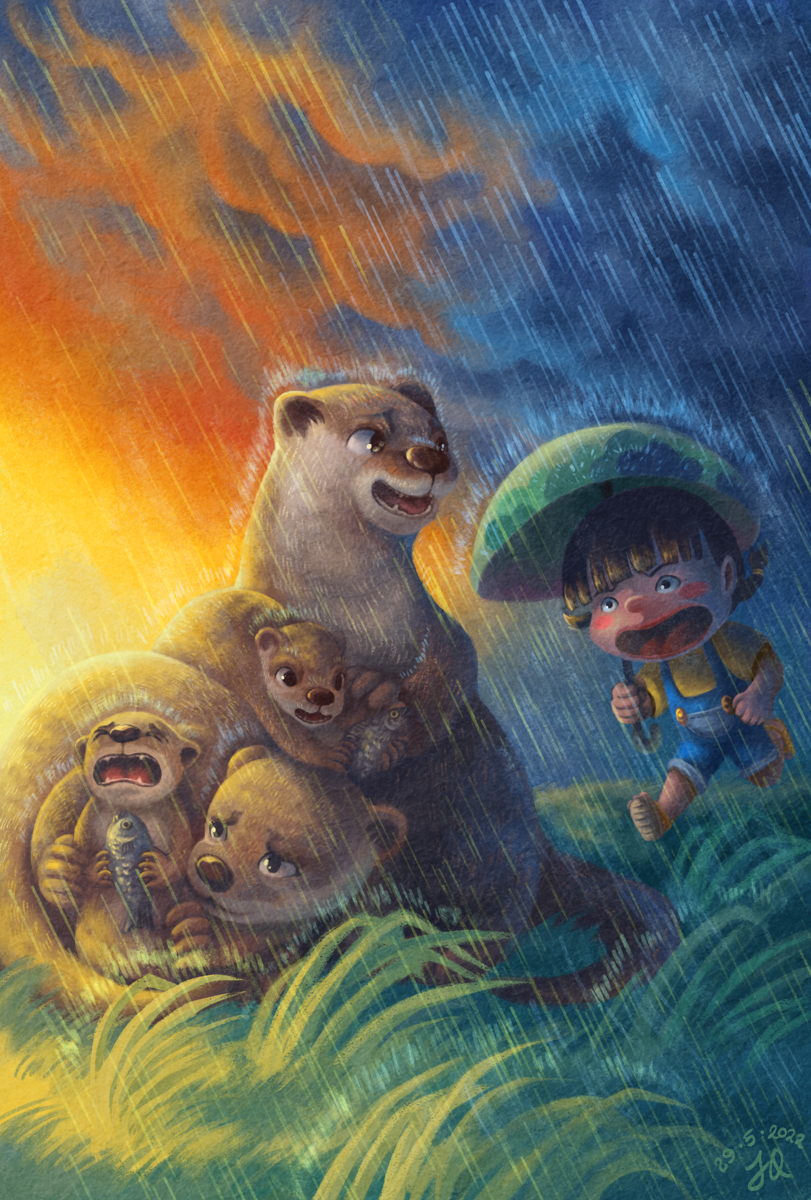
Story: character's emotions are clear and intense, but the story is ambiguous and unclear. People couldn't figure out why the kid was running towards the otters, or why the otters had the expressions they had. The lighting was dramatic but didn't really serve to enhance the storytelling. The spotlight is on the baby otter who's crying but it's unclear why he's crying, and really the emphasis should have been on the girl running towards Mr. Otter, her long-lost friend. I had a clear story in my head but it needed a lot of backstory or accompanying text to support it (reunion between Mr. Otter and Shan Shan (the kid), after Mr. Otter set up his new family)Technical issues: I think rendering overall was fine although there are now a couple of things I can see that I'm not satisfied with. Shan Shan's legs are actually too long and her posture seems slightly stiff. Also the cropping is too close, and Ma ma otter's face is a little off. I'm ambivalent about the rain splatters around the characters. Some people thought it looked a little unnatural.
-
And here is my first entry for July's "Rabbit Road Race". I'll edit this post later to write up a little more about my process behind this piece. In the meantime, feedback please!
Let me know if the story is clear, if you get the secondary stories, if the background is working (man I struggled with that), if the expressions on the main characters are understandable, any technical issues etc.
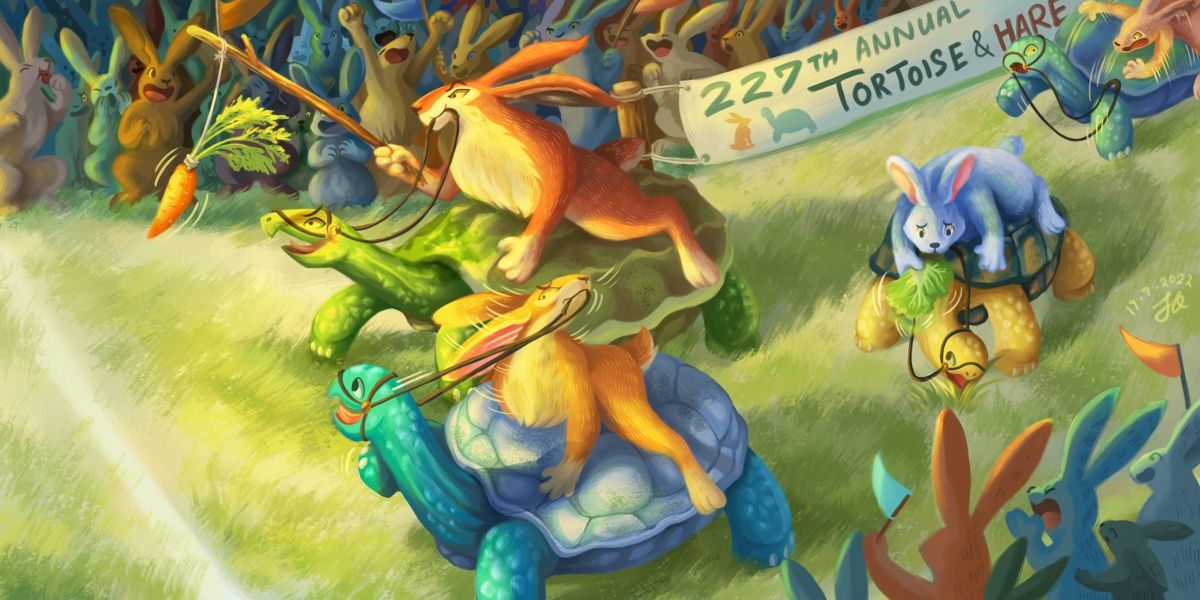
-
@JQ stories are clear and colors are beautiful! Well done, I think I like the one falling off the best
 ️
️ -
@Asyas_illos also make sure you are working inside the required sizes which is the longest side is 1200 px
 It’s hard to tell but you might be ok
It’s hard to tell but you might be ok -
@JQ This is such a great idea! I'm loving looking at all of the racers. I kind of wish that the focus was more on the first two racers and the others can be smaller and in the background.
-
Thanks @Asyas_illos and @Patricia-Dishmon for the validation and feedback! Happy that y'all got the story and like it
 Especially the falling off one, I was slightly afraid it might not have been obvious enough.
Especially the falling off one, I was slightly afraid it might not have been obvious enough.I get your point Patricia about emphasizing the main racers more and pushing the other two into the background more, though I feel in that case I might have to give up on the secondary stories as the resolution would probably be too poor (and the one with purple rabbit waving the lettuce is a little subtle).
-
Here's my next entry for Rabbit Road Race. While the tortoise X hare concept was the first one that crossed my mind I figured that it'd probably be one that'd be done to death, so I wanted to do some more based on Chinese cultural references.
Of course the problem there would be that unlike the tortoise and hare it wouldn't be as recognizable to a Western audience, so I don't know if the story or concept will come through as clearly at first glance to such an audience (eg. the judges), but I still think I had a cool concept so I wanted to give it a shot.
Let me know if you got the story before reading the explanation below the piece, and of course any other feedback is very much welcome!
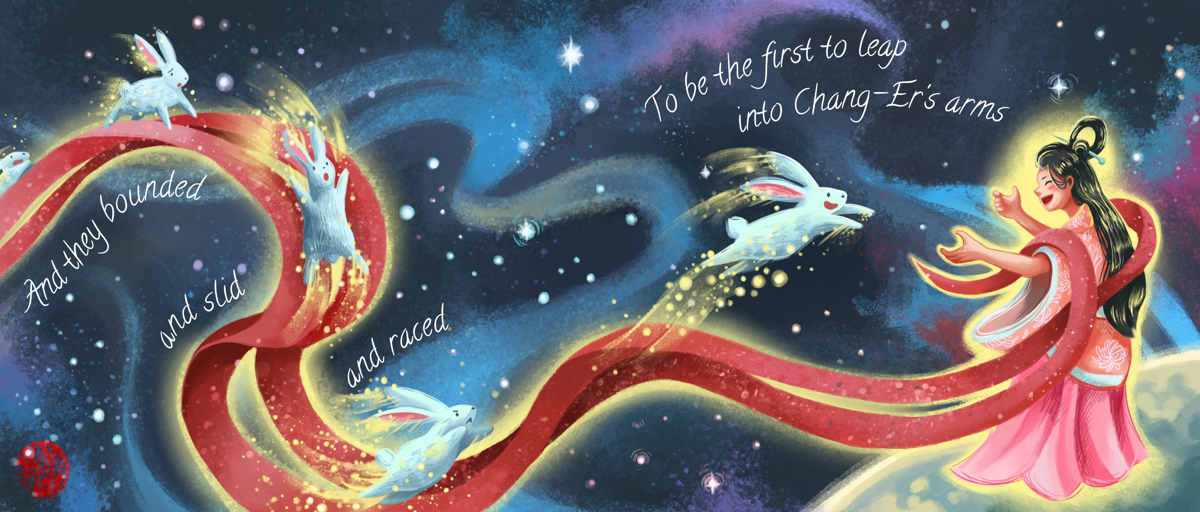
So the concept is based on a well-known Chinese folktale about the moon deity Chang-Er. There are many variations of the tale but the gist that I can recall off the top of my head goes something like:
Once upon a time, there were nine suns, who were the sons of a heavenly king and queen. Their mother would supervise them as they went out to play each day, so that there would only be one sun in the sky at a time. One day the brothers grew restless and decided to all go out to play together unbeknownst to their mother. With nine suns all in the sky at once the Earth was scorched and the people suffered from a terrible drought and heat (maybe not too unlike the climate-change-induced heatwaves ravaging various parts of the world this summer
 ).
).Hou Yi, another deity and a famed archer, decided to go to the people's rescue and started shooting down the suns. He was a good shot and got eight of them while leaving one alive so that the people of Earth could still enjoy the warmth of the one sun that they were used to. When their father, the heavenly king, heard that eight of his sons had been shot dead, he was furious and sent a complaint against Hou Yi to the Heavenly Jade Emperor, demanding that he be banished to the mortal realm.
Henceforth, Hou Yi and his wife, Chang-Er, were banished from heaven and had to live their life as mortals. Chang-Er was devastated by this, and constantly pined to return to heaven and an immortal life. One day, Hou Yi came upon a medicinal deity who bestowed upon him two heavenly pills. The deity claimed that upon consuming one pill, one would be able to live forever and never grow old in the mortal realm. Upon consuming two pills, one would be able to ascend to heaven as an immortal deity.
Hou Yi told Chang-Er about the pills and handed them to her for safe-keeping. Chang-Er was at once delighted but deeply conflicted; she desperately wanted to return to heaven, but if she ate both pills, there would be none left for her husband and he would be doomed to live and die as a mortal. If they ate one pill each, they would never grow old or die but they would remain confined to the mortal realm.
One night, after much agonizing, Chang-Er finally decided to eat both of the pills. Upon ingesting the second pill, she felt her body grow as light as a feather and before she knew it she was rising up to heaven. At that moment she felt a terrible guilt for what she'd done, leaving her husband behind. She was too ashamed to return to the heavenly palace, and instead fled to the moon where she has lived ever since.
On the moon, all she had for company was one lone osmanthus tree, and a celestial jade rabbit who was the keeper of the lunar medicinal hall. This is why in the various stories and imagery surrounding Chang-Er, one often sees her with a white jade rabbit.
Aaand with that lengthy backstory out of the way, my idea was to expand on Chang-Er's story and imagine how she would live out her life on the moon. Like any self-respecting Chinese deity she'd probably make frequent trips to the mortal realm (if only to visit her husband), and maybe she starts to bring back more and more mortal white rabbits as pets and turns them into celestial jade rabbits.
These rabbits always compete to race to the moon, on Chang-Er's long silken sash, to be the first to leap into her arms and be welcomed back home.
-
And just to add a little more on my process working on this piece itself...it was actually pretty experimental and quite challenging and frustrating at times. I wanted to try rendering in a flatter and more textured style, very different from my usual style. I'm not very used to it yet so it took a lot of tweaking and revisions to get to a point where I felt somewhat satisfied.
Even then, I still feel there are things lacking in this piece, although the final version is I think a huge improvement over my first version below. But I think I've spent too much time on it and need to move on for now.
If anyone has any feedback or tips to share on how to render better in this style I'd love to hear it.
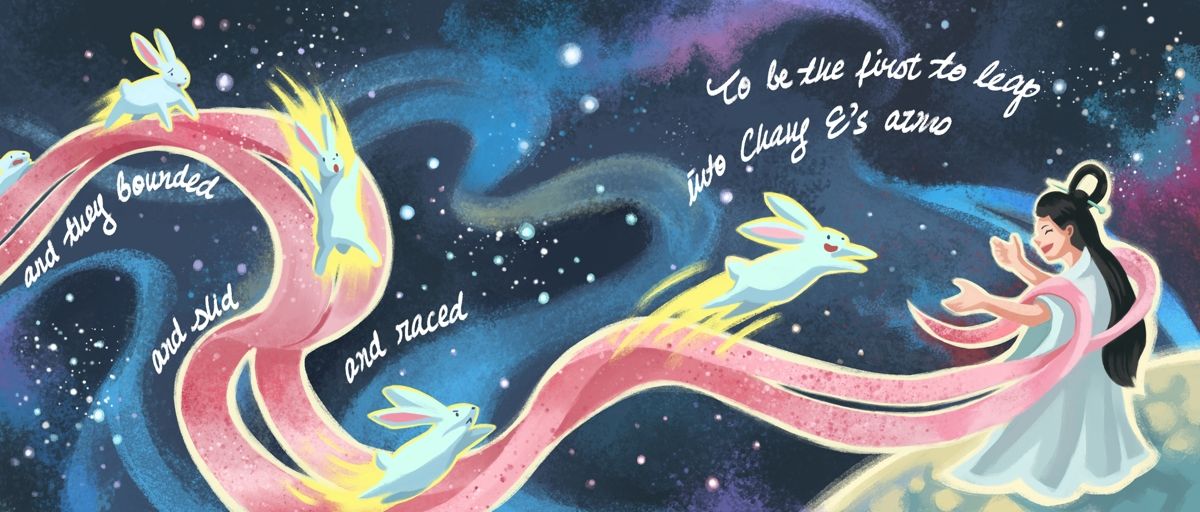
-
@JQ The story is super interesting, could you please finish it and tell the moral of the story? I want the spoilers!!! I will be googling it

-
@Eliana-Bastidas That is the typical (finished) story told of Chang-Er
 In fact it's two stories squeezed into one as the story of Hou Yi shooting down the eight suns is usually told separately from the story of Chang-Er fleeing to the moon.
In fact it's two stories squeezed into one as the story of Hou Yi shooting down the eight suns is usually told separately from the story of Chang-Er fleeing to the moon.Many Chinese folktales don't tend to have very clear-cut "moral of the story"'s like Aesop fables. Much like the language itself, there are often lots of the grey areas for varied interpretations XD (not to mention many many variations of the same folktale itself, although I guess that applies to all cultures)
-
These were the initial sketches in pencil and markers
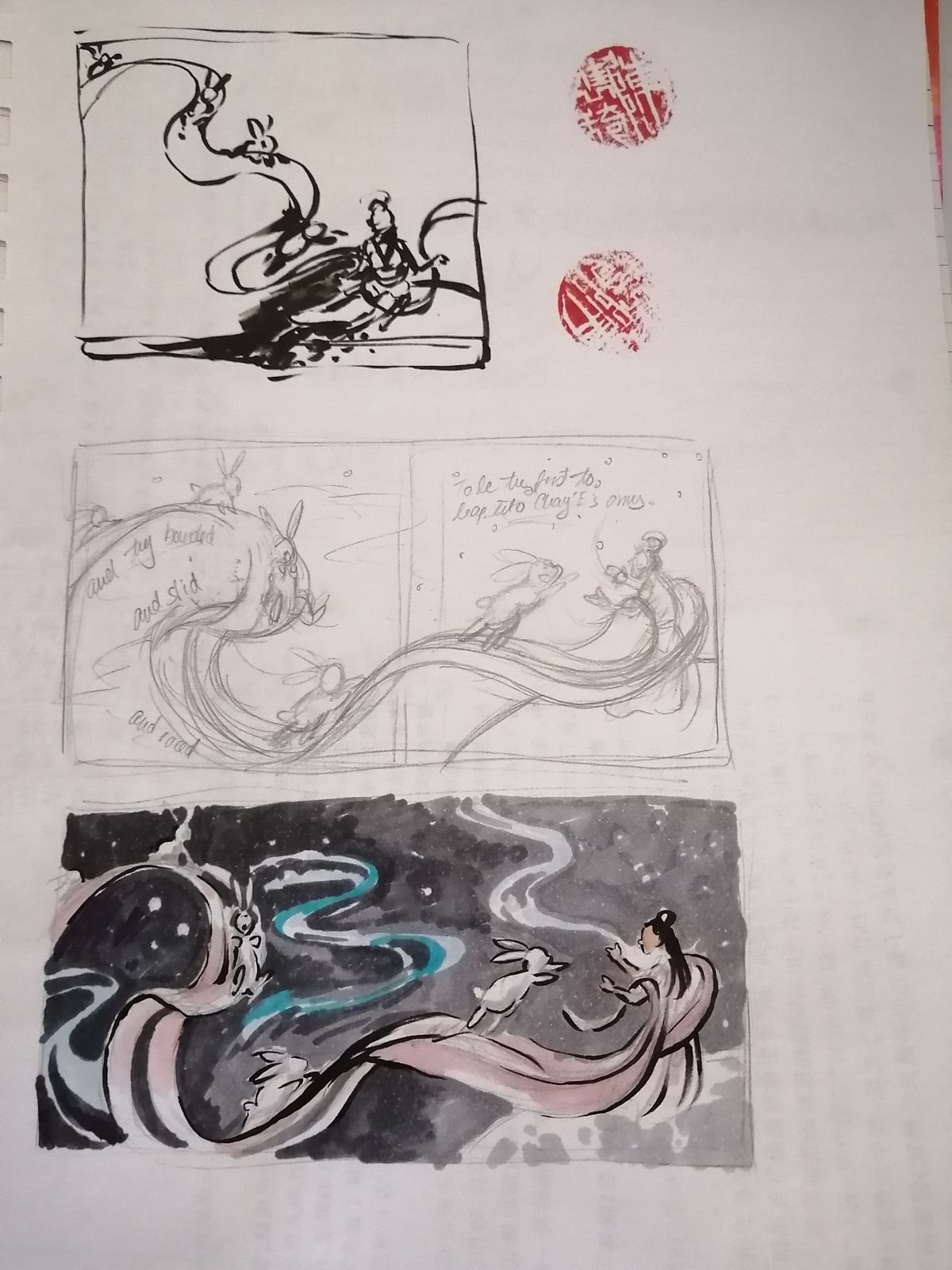
I forgot to add that it's a Celestial Rabbit Galactic Silk Road Race! (another slightly lame cultural/historical/geographical reference there lol; also Mario Kart)
-
@JQ haha, yeah I google it, and it seems there are different versions about the same story. It was really interesting! And your idea I think you really nailed it.
-
I'm working on another piece for Rabbit Road Race, again based on Chinese mythology, though in this case the cultural reference should be more familiar globally, especially since it's shared by many other Asian cultures - it's the 12 animals of the zodiac, which includes a rabbit amongst them.
Although concept-wise I feel this risks elimination because it may not be rabbit-y enough to the judges, once again I thought it was a cool concept that I wanted to execute. It's also a chance for me to play with a different style. I'm going to try a flatter, textured style featuring traditional Chinese paper cut motifs. I'm also going to try something different this time - working over a value underpainting.
If anything I think it'll be a good portfolio piece as it's compositionally complex (featuring 10-12 stories in one picture, depending on how you count it) and will hopefully be stylistically interesting. There will eventually be story text weaved into the picture too.
Hope I manage to pull it off; in the meantime here are some WIPs:
- Rough sketch
- Cleaned-up line work
- Value underpainting
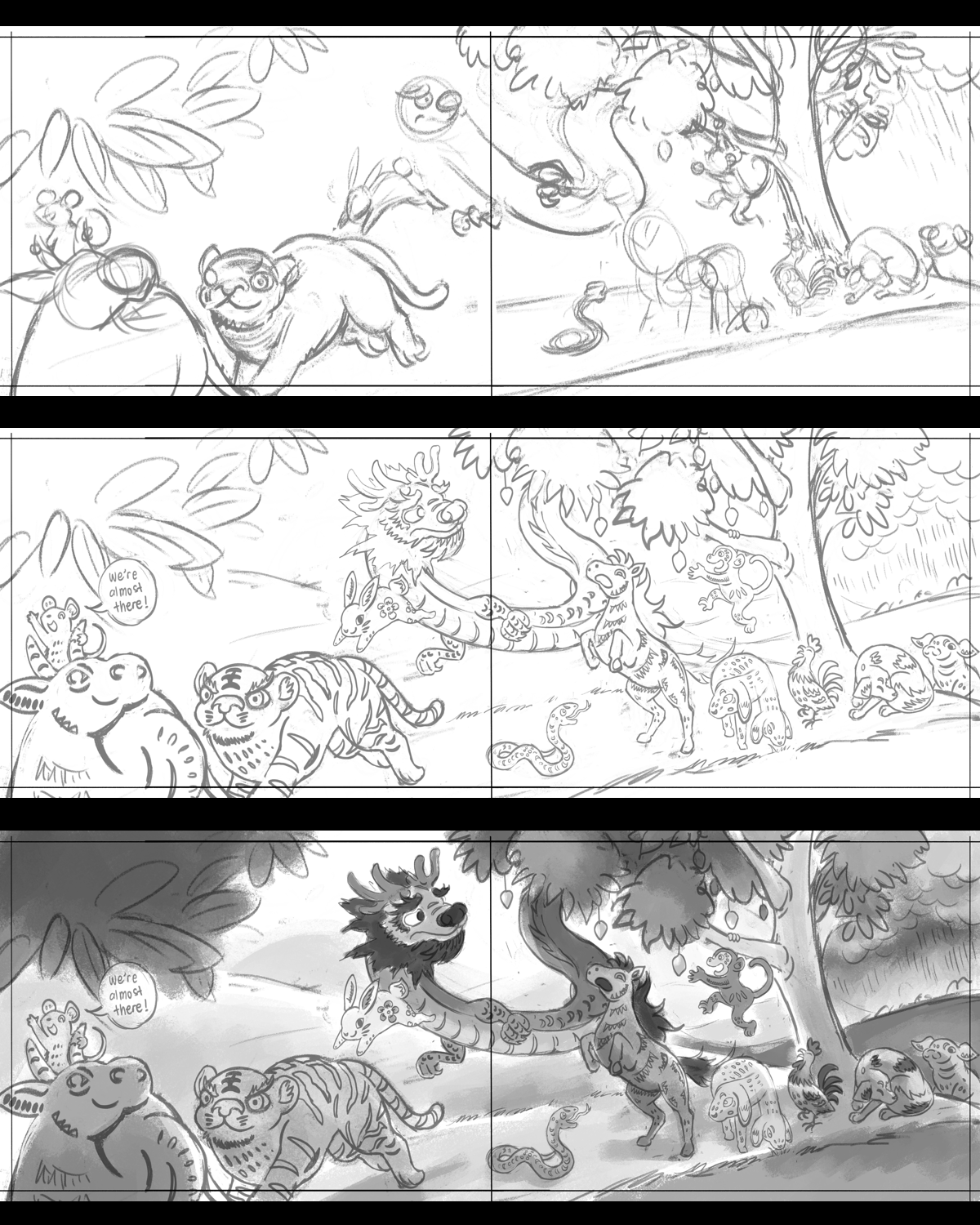
-
Initial colours followed by text + colour and composition adjustments to accommodate text. It was quite challenging trying to fit all that text in

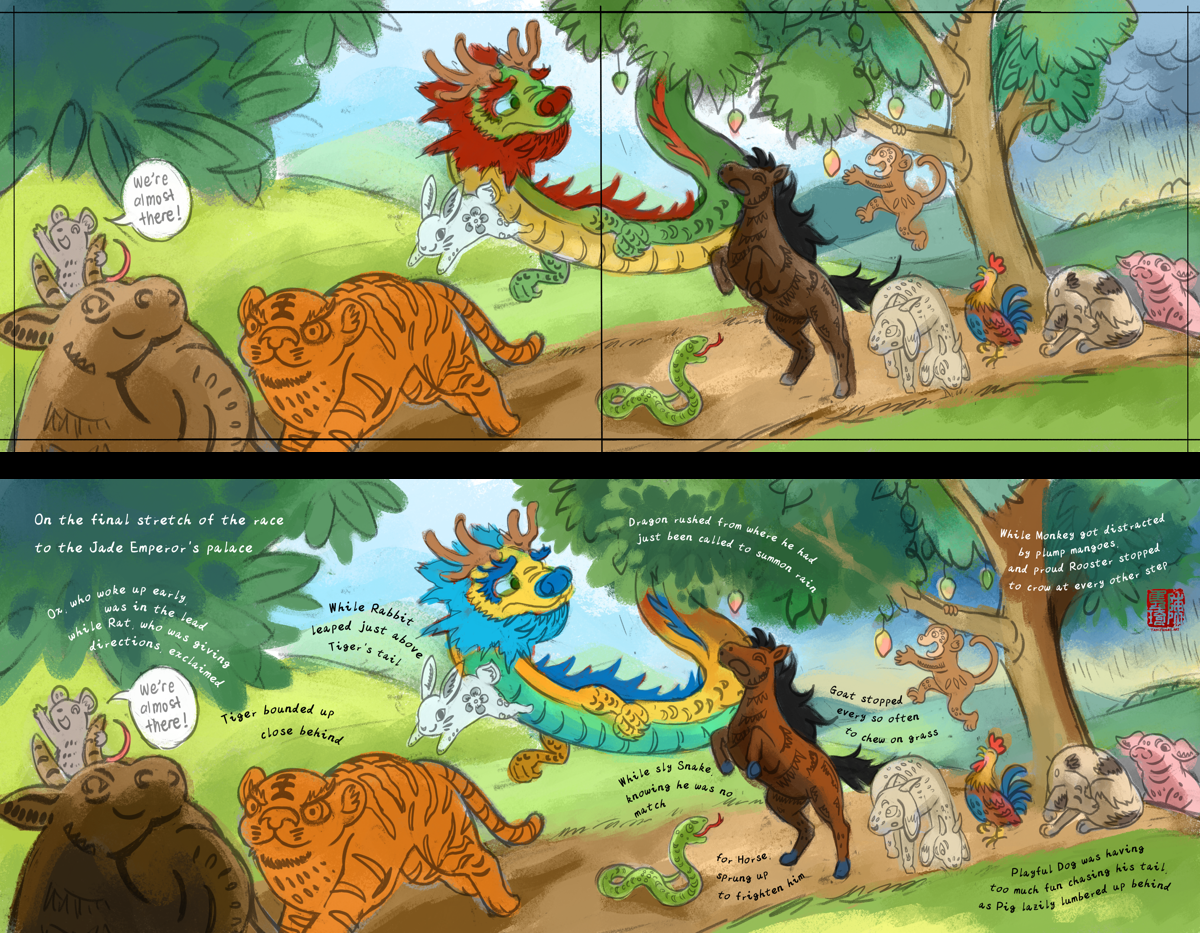
-
@JQ Looking amazing! But it seems to me that you have trouble to transition from your initial idea of black and white to color. Have you tried to put a color layer with white above your painting so you can check your values after adding the colors? I think you messed up a bit the values when you added the color, the black and white composition looks really strong and amazing to me, but it gets lost in the color version.
-
@Eliana-Bastidas Thank you! Yes I get what you mean, I think the contrast was lost because I darkened the animals especially relative to the foliage. To be honest doing the value underpainting didn't quite work out as planned as overall the colors of the animals turned out way lighter than I wanted, so I saturated and darkened them but didn't darken the foliage equally. I think I'm still used to working mostly in color and adjusting values in color directly.
No worries though, it's still WIP and an experimental style, I will continue to keep the values in mind as I work on it!
-
As I figure out how to effectively weave the Chinese papercut motifs in, I dug out some photos of my old papercuts. I have been doing these every Chinese New Year since 2020, which was the Year of the Rat and the start of a new cycle. If I can keep it up till 2032 I will have all 12 animals climbing along my wall

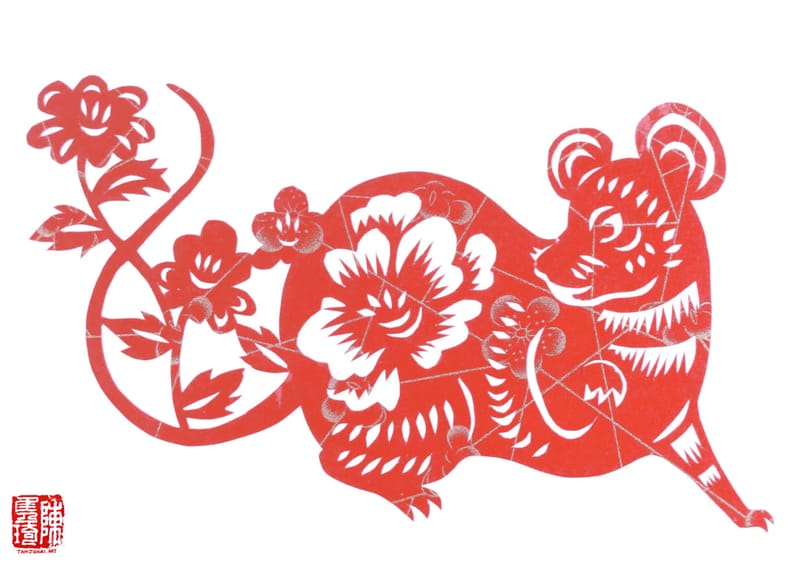
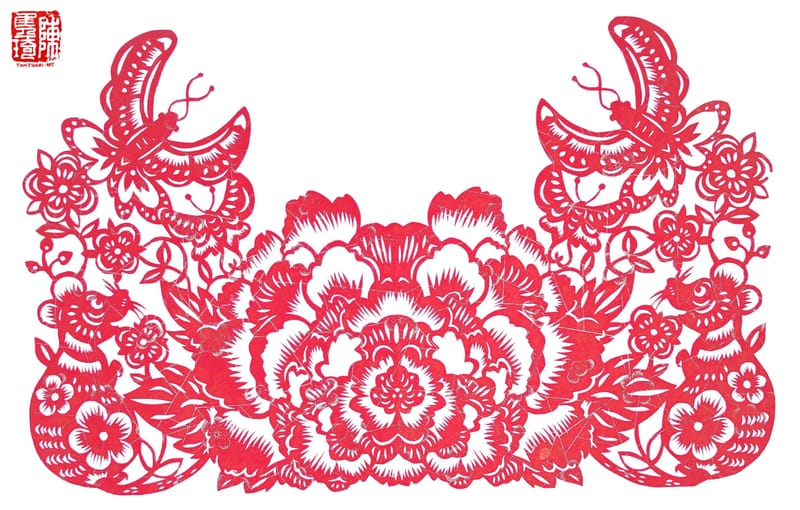
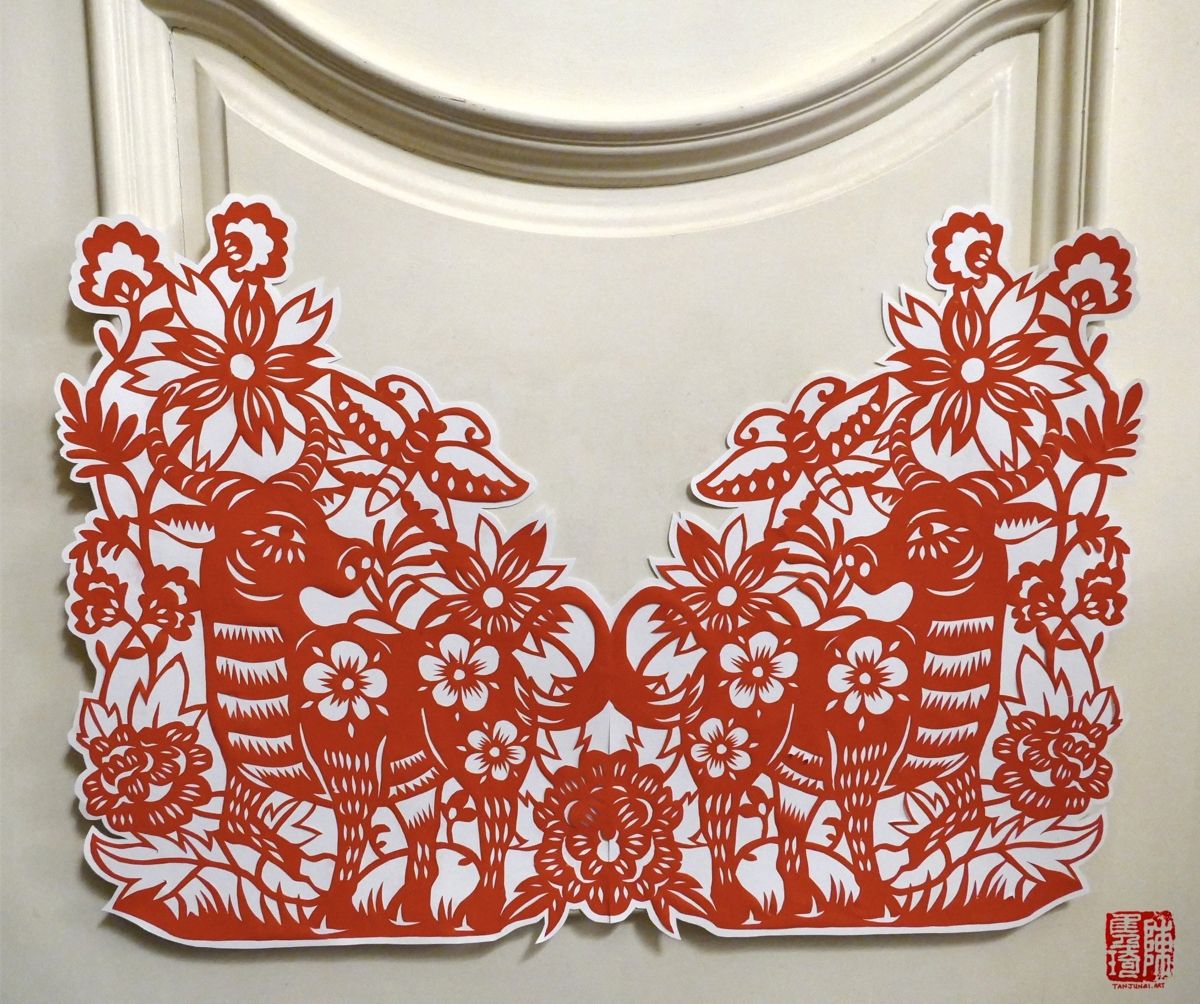
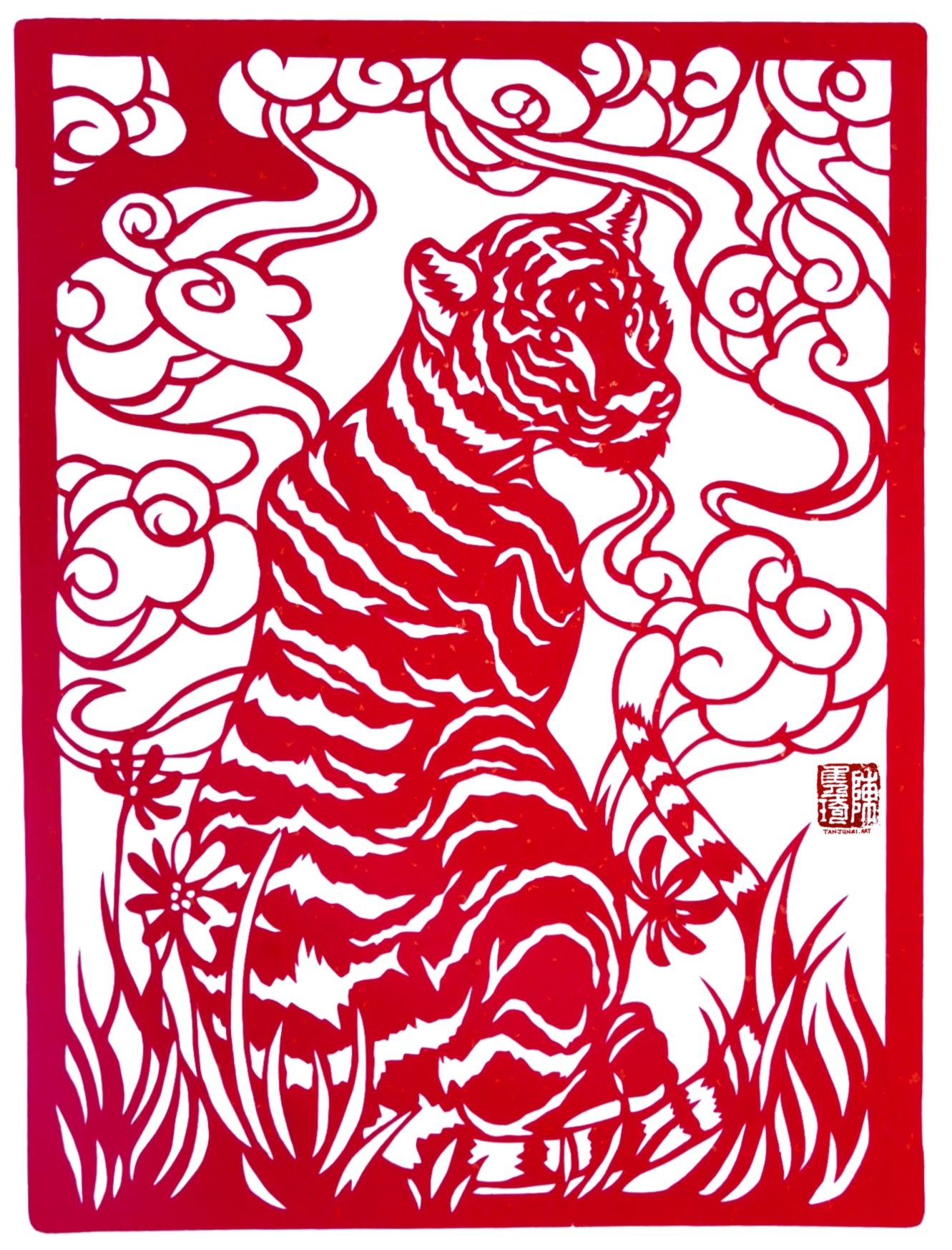
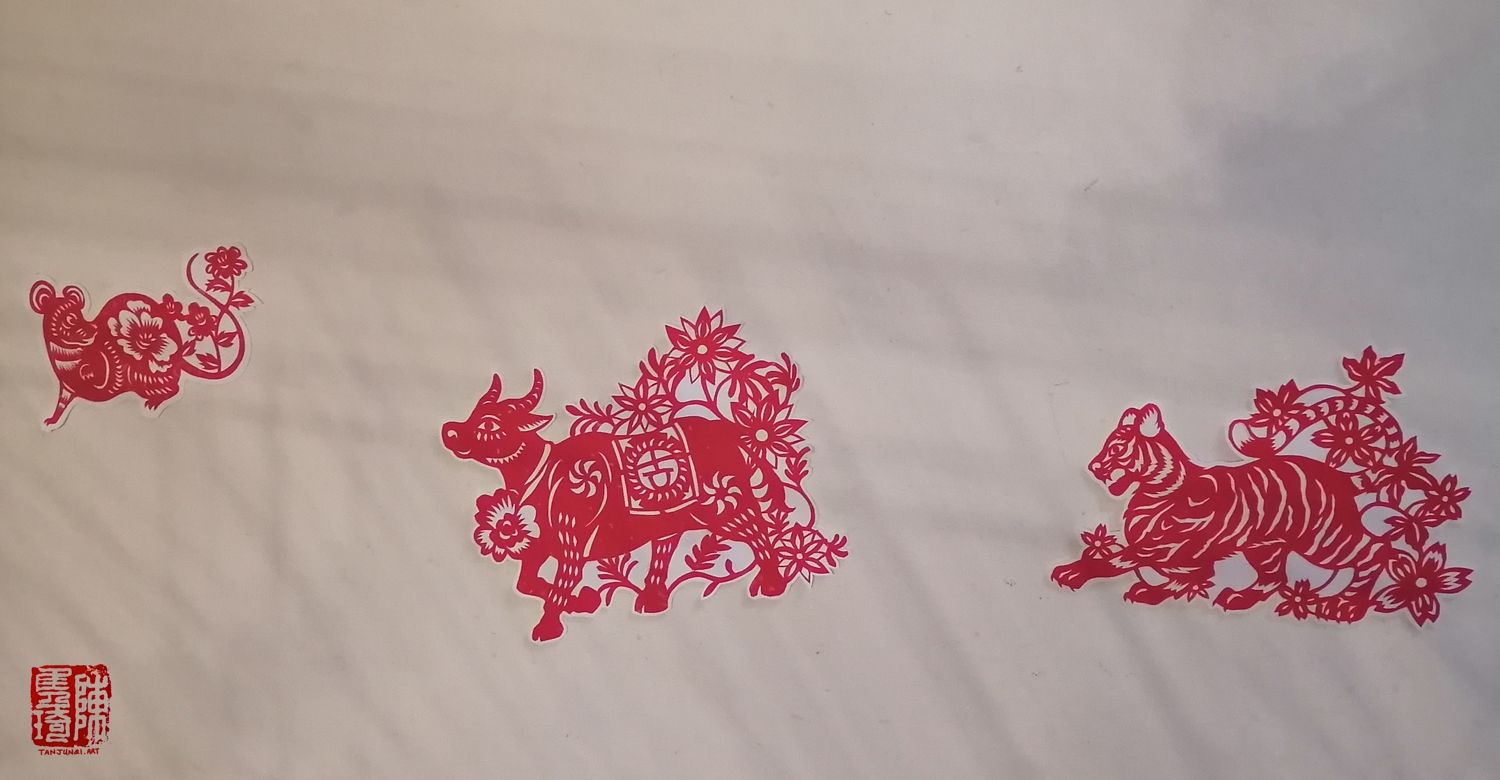
Still playing around with how to translate motifs in a negative-positive space aesthetic to one with multiple shades and colors
-
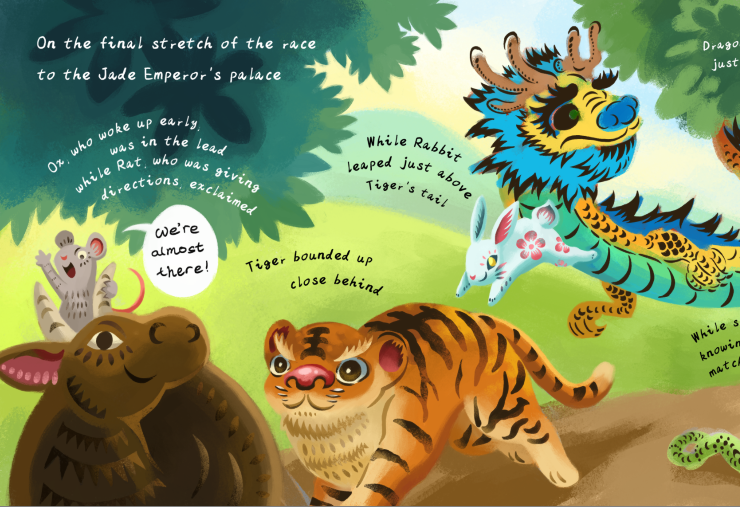
-
WIP after "cutting out" the motifs
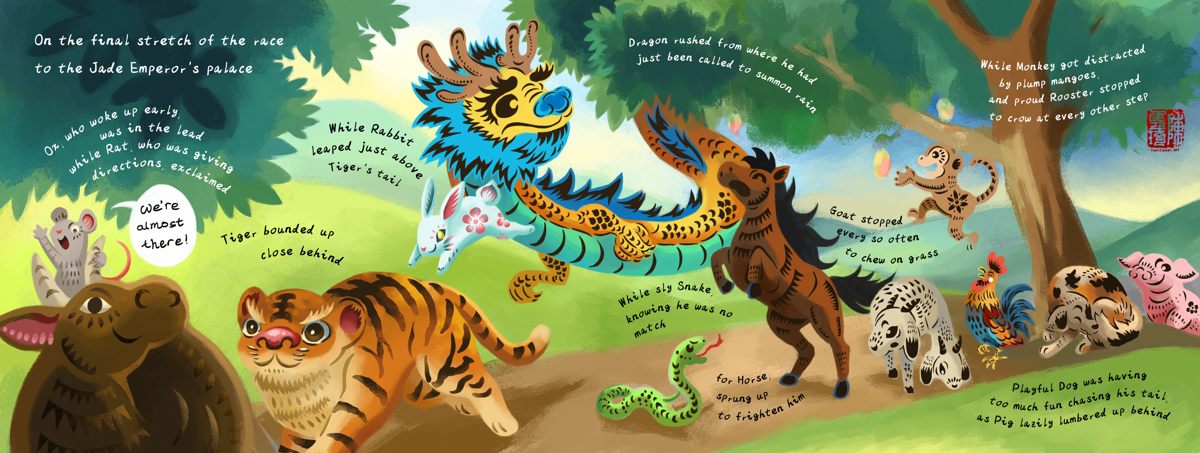
And the finished piece
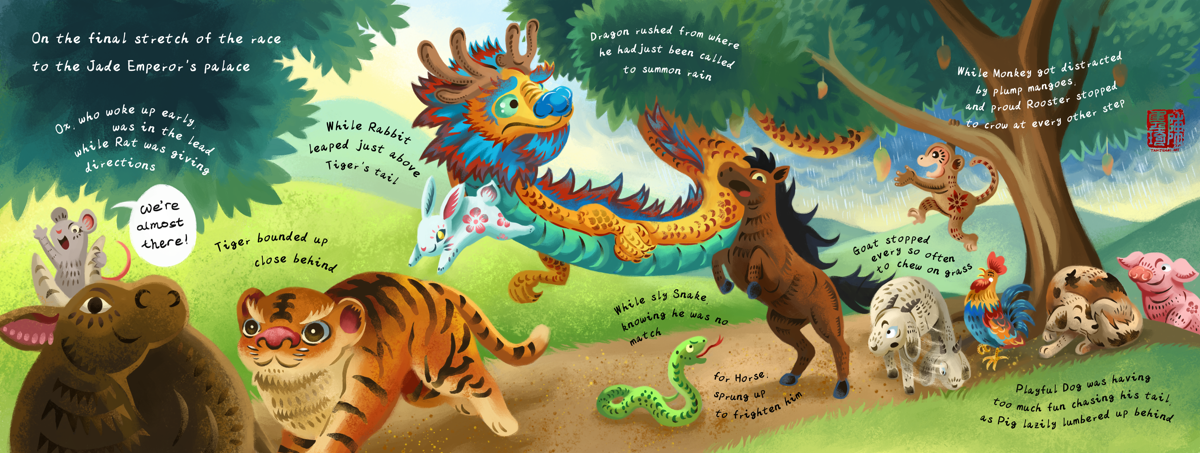
-
@JQ Wow, another finished contest piece! This one is so colourful and detailed. I can hear that Chinese zodiac song playing in my head, hahaha, kuai pao, kuai pao!!
I love your ideas and your rendering style -- and your super fast working speed! My goodness!! I'm barely going to be able to turn one piece in, haha!
